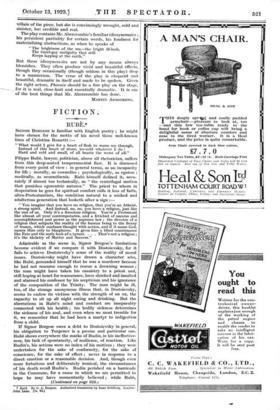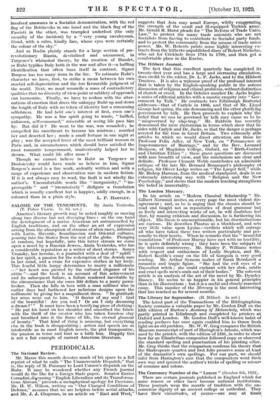FICTION.
RUBE.* Szowon BORGESE is familiar with English poetry ; he might
have chosen for the motto of his novel those well-known lines of Christina Rossetti :—
"What would I give for a heart of flesh to warm me through, Instead of this heart of stone, ice-cold whatever I do ! Hard and cold and small, of all hearts the worst of all."
Filippo Rube, lawyer, politician, above all rhetorician, suffers from this deep-sealed temperamental flaw. It is discussed from every point of view : in general terms, as an incapacity for life ; morally, as cowardice ; psychologically, as egoism ; medically, as neurasthenia. Rube himself defined it, accu- rately if almost too technically, as "the centrifugal motion that punishes egocentric natures." The priest to whom in desperation he goes for spiritual comfort calls it loss of faith, ultra-Protestantism, the condition natural to a wicked and adulterous generation that looketh after a sign :— "You imagine that you have no religion, that you're an Atheist, a strong spirit. And instead, no, no, you have a religion, just like the rest of us. Only it's a ferocious religion. You're a Protestant like almost all your contemporaries, and a fetichist of success and accomplishment and power as the supreme law ; the devotee of a religion that subjects the reality of the human being to the frenzy of reason, which confuses thought with action, and if it name God, names Him only to blaspheme. It gives him a blind countenance like Fate and the surly look of a tyrant. . . . That's not a religion ; it's the idolatry of Matter and Success."
Admirable as the scene is, Signor Borgese's limitations become evident if we compare it with Dostoievsky, for it fails to achieve Dostoievsky's sense of the reality of moral issues. Dostoievsky might have drawn a character who, like Rube, persuaded himself that he was a murderer because he had not resource enough to rescue a drowning woman ; the man might have taken his casuistry to a priest and, still hoping at heart for reassurance, have shocked and insulted and alarmed his confessor by his scepticism and his ignorance of the composition of the Trinity. The man might be ill, too, of the strange anonymous illness that, in Dostoievsky, seems to endow its victims with the strength of an ox, the capacity to sit up all night eating and drinking. But the aberrations in Rube's mind and conduct are inseparably connected with his health ; his bodily sickness determines the sickness of his soul, and even when we most tremble for it, we remember that he had been a martyr to indigestion from a child.
If Signor Borgese owes a debt to Dostoievsky in general, his obligation to Turgenev is a precise and particular one. Rube shows everywhere the marks of Rudin, in his ineffective- ness, his lack of spontaneity, of resilience, of reaction. Like Rudin's, his actions were no index of his motives ; they were undertaken for the sake of conformity, for the sake of conscience, for the sake of effect ; never in response to a direct emotion or a reasonable decision. And, though even more fortuitous and deliberately ironical, the circumstances of his death recall Radixes. Rudin perished on a barricade in the Commune, for a cause in which we are permitted to
hope he may have momentarily believed ; while Rube, (Continued on page 522.) • Ruts. By G. A. Borgese. Authorized translation by Isaac Goldberg. London : John Lane. CU. 6d.1
involved unawares in a Socialist demonstration, with the red flag of the Bolsheviks in one hand and the black flag of the Fascisti in the other, was trampled underfoot (the only casualty of the incident) by a "very young cavalryman, blond, with a calm, kindly face, whose eyes were certainly the colour of the sky."
And as Rudin plainly stands for a large section of pre- revolutionary Russia, devitalized and unmanned, in Turgenev's whimsical theory, by the creation of Hamlet, so Rube typifies Italy both in the war and after it—a baffling identification that often loses itself in contrast. Signor Borgese has too many irons in the fire. To estimate Rube's character we have, first, to strike a mean between his own morbid self-depreciation and the too favourable judgment of the world. Next, we must reconcile a mass of contradictory qualities that no diversity of view-point or subtlety of approach can harmonize. Finally, we have to reckon with the alter- nations of emotion that drove the unhappy Rube up and down the length of Italy with no token of identity but a consuming selfishness. He had held one's interest at first, even one's sympathy. He was a fine spirit going to waste, "baffled, unknown, self-consumed," miserable at seeing life pass him by. But did it ? He went to the war, was wounded ; he compelled his sweetheart to become his mistress ; married her and deserted her ; made a small fortune in one night at play ; was the accepted lover of the most brilliant woman in Paris and, in circumstances which should have satisfied the most romantic temperament, inadvertently helped her to drown. What could life offer more ?
Though we cannot believe in Rube as Turgenev or Dostoievsky would have made us believe in him, Signor Borgesc's novel is a fine work, ardently written and with a range of experience and observation rare in modern fiction. If it is not always easy to read, the fault is not wholly the author's. Uncomfortable words like " inorganicity," " im- prorogable " and " irremissively " disfigure a translation which is usually excellent but is happier, oddly enough, in a
coloured than in a plain style. L. P. HARTLEY.



























































 Previous page
Previous page